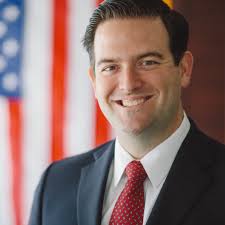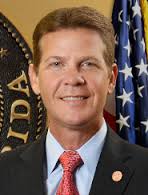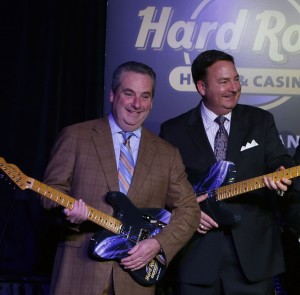Texas Gov. Greg Abbott (R) wanted the Texas Racing Commission to repeal its approval of ‘historical racing’ at Lone Star State tracks. Rather than put it on the agenda, commission Chairman Robert Schmidt handed in his gavel, exchanging the chairmanship for an ordinary seat on the TRC. Abbott gave the chairmanship to Rolando Pablos, who was quick to accommodate the governor’s wishes. Schmidt downplayed the clash as “an honest difference of opinion,” although that doesn’t fully explain why he chose to step down rather than simply hold a vote. He and Abbott were also at odds with how soon the vote was to be held, with Schmidt maintaining that he was willing to revisit the issue in February.
The Texas Lege has repeatedly threatened to defund the TRC unless it pulled the offending devices, shown above. At issue is whether it’s within the commission’s remit to be authorizing new variants of gambling at Texas tracks. Abbott’s point man on the issue, Lt. Gov. Dan Patrick (R) reiterated, “As I have previously stated, I believe the decision to publish rules for the implementation of historical racing was not an appropriate action for the commission.” Patrick and Abbott can expect some pushback from the Texas Thoroughbred Association, which calls the commission’s vote the result of “a lengthy, transparent and inclusive process,” and is prepared to take Abbott to court.
TTA Executive Director Mary Ruyle, in a letter to Patrick (left), takes issue with the concept that this is an expansion of gambling in Texas, arguing that  instant racing merely uses “technology that is now available to present horse and greyhound racing in a new delivery system.” That’s going to be a tough sell in Austin, where the administration and state GOP see casinos using instant racing as a stalking horse. Right now, the games are on hold, in keeping with a restraining order by an Austin judge who happens to share Patrick’s interpretation of the law. However, Patrick wants the races rolled back by the commission, not the courts, while Ruyle would keep litigating. “It appears that you may wish to disregard the right of Texans to due process through the court system,” she wrote him.
instant racing merely uses “technology that is now available to present horse and greyhound racing in a new delivery system.” That’s going to be a tough sell in Austin, where the administration and state GOP see casinos using instant racing as a stalking horse. Right now, the games are on hold, in keeping with a restraining order by an Austin judge who happens to share Patrick’s interpretation of the law. However, Patrick wants the races rolled back by the commission, not the courts, while Ruyle would keep litigating. “It appears that you may wish to disregard the right of Texans to due process through the court system,” she wrote him.
However, with Abbott having recently appointed two new members to the TRC, it’s likely that the electronic ponies of instant racing have run their last furlong.
* “My phone started blowing up when I was at the Miami Heat game,” says Rep. Jose Felix Diaz (R, right), one of Gov. Rick Scott‘s key allies in crafting a new compact with Seminole Tribe. The buzzing cellphone was indicator of  how surprised — and incensed — Diaz’s fellow solons were with Scott’s deal. Even in South Florida, where the state’s casino industry is concentrated, the compact isn’t playing to rave reviews. For instance, Magic City Casino was planning to expand its operations to its Bonita Springs dog track. But the compact would restrict racinos to Miami-Dade and Broward Counties. That inspired Magic City Vice President Izzy Havenick to fulminate, “It’s very impressive that the governor got $3 billion to pick winners and losers and put longstanding family businesses like mine out of business.”
how surprised — and incensed — Diaz’s fellow solons were with Scott’s deal. Even in South Florida, where the state’s casino industry is concentrated, the compact isn’t playing to rave reviews. For instance, Magic City Casino was planning to expand its operations to its Bonita Springs dog track. But the compact would restrict racinos to Miami-Dade and Broward Counties. That inspired Magic City Vice President Izzy Havenick to fulminate, “It’s very impressive that the governor got $3 billion to pick winners and losers and put longstanding family businesses like mine out of business.”
Some of the legislative ire was also due to the way Scott smuggled the pact out like a fugitive in the night: no press conference, just a blunt, 8 p.m. statement,  taking lawmakers, even ones involved with the process like Diaz, by surprise. Scott, who turned a deaf ear to criticism, is planning to use the compact as a carrot to get a $1 billion tax cut through the next Lege. State Senate President Andy Gardiner (R, left) seems to be entrenching for a fight, promising to send Scott a budget that incorporates not one cent of gaming revenue. “I don’t support the expansion of gambling,” he huffed.
taking lawmakers, even ones involved with the process like Diaz, by surprise. Scott, who turned a deaf ear to criticism, is planning to use the compact as a carrot to get a $1 billion tax cut through the next Lege. State Senate President Andy Gardiner (R, left) seems to be entrenching for a fight, promising to send Scott a budget that incorporates not one cent of gaming revenue. “I don’t support the expansion of gambling,” he huffed.
State Sen. Jack Latvala (R) predicted rough sledding for the compact, calling its focus on South Florida a “fatal flaw … “If we’re going to have to close down facilities that have been here 70 to 80 years so the Indians have a monopoly and can continue to expand their offerings, that’s just wrong,” sounding the resentful note of a white man oppressed by the big, bad Native American. (Latvala looks like Santa Claus’ grumpy younger brother.)
Others were more flexible. Palm Beach Kennel Club lobbyist Brian Ballard said that parimutuels were being relegated to second-class citizenship. But, he added, “this is a beginning point. All the component parts  are there.” No Casinos’ John Sowinski, by contrast, went into a tizzy, opposing expansion of gambling in Florida in any way, shape or form. Sowinski was particularly incensed by a provision that would allow as many as 6,000 slots per casino. One hopes Hard Rock International CEO Jim Allen (far left) hasn’t ordered any craps or roulette tables for the Seminoles yet. Between pressure groups like Sowinski’s, disgruntled gaming operators like Havenick and elected casino opponents like Gardiner, Scott and the Seminoles will have a high hurdle to clear as they try to get this compact approved.
are there.” No Casinos’ John Sowinski, by contrast, went into a tizzy, opposing expansion of gambling in Florida in any way, shape or form. Sowinski was particularly incensed by a provision that would allow as many as 6,000 slots per casino. One hopes Hard Rock International CEO Jim Allen (far left) hasn’t ordered any craps or roulette tables for the Seminoles yet. Between pressure groups like Sowinski’s, disgruntled gaming operators like Havenick and elected casino opponents like Gardiner, Scott and the Seminoles will have a high hurdle to clear as they try to get this compact approved.
* True, Penn National Gaming‘s Plainridge Park hasn’t entirely lived up to expectations (electronic table games were a bust). But that’s no excuse for the Boston Globe‘s resident anti-casino columnist, Shirley Leung, to push the panic button.

